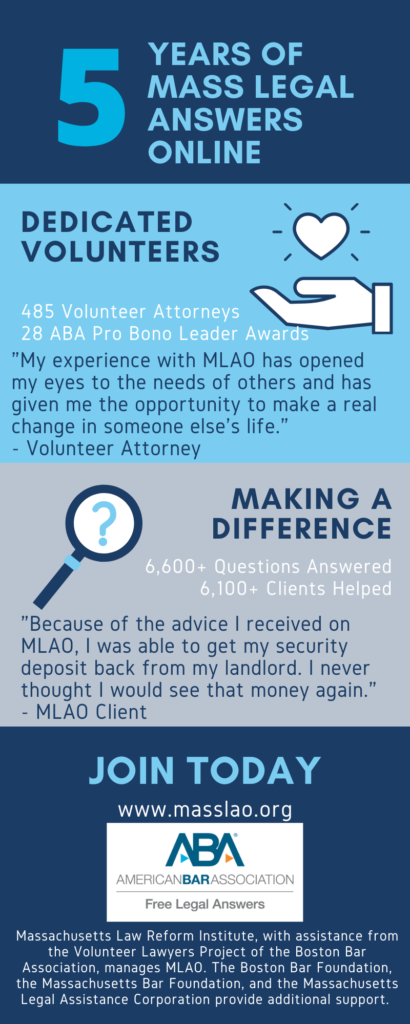CLAVC Initiative Honored with Award from Massachusetts Office for Victim Assistance
FOR IMMEDIATE RELEASE
Contact: Marlena Idrobo, midrobo@mlac.org
Boston, April 15 – The Civil Legal Aid for Victims of Crime Initiative received the 2022 Innovation Award from the Victim and Witness Assistance Board and the Massachusetts Office for Victim Assistance as part of their 2022 Victim Rights Awards.
CLAVC, administered by the Massachusetts Legal Assistance Corporation and the Massachusetts Law Reform Institute, helps victims of crime throughout Massachusetts with their related civil legal problems — including family law, housing, immigration, disability rights, child welfare, education, consumer, identity theft, employment rights and public benefits.
MLRI and NASW-MA Applaud the Baker Administration and Massachusetts Legislature for Breaking Down Barriers to Increase Access to Public Benefits
BOSTON – Following years of advocacy by more than 150 anti-poverty and public health organizations, on February 15, 2022, the Baker Administration announced their plan to allow low-income households the right to apply for Supplemental Nutrition Assistance Program (SNAP) benefits at the same time they sign-up for MassHealth. This implements a legislative directive included in both the FY21 and FY22 state budgets, representing a significant step toward a streamlined application process for means-tested benefits that has widespread bipartisan support in the legislature, impacting roughly 600,000 MassHealth recipients who likely qualify for SNAP.
Statement of Patricia Baker, Senior Policy Advocate, in response to SNAP & MassHealth application change
For too long, Massachusetts households in need have faced bureaucratic obstacles in order to access benefits they need to make their rent payment or put food on the table. For anyone seeking assistance, times are already difficult for them and we should be doing everything we can to ease the burden.
It’s Time to Lift Children Out of Deep Poverty
The Boston Globe had it right in their January 25, 2022 editorial piece Ending welfare as we know it – again: states should tie their cash assistance payments to inflation so that poor, vulnerable families don’t get squeezed by rising costs.
Analysis of the Governor’s FY23 Budget Proposal
The annual budget process begins each year when the Governor files budget recommendations as a bill with the Massachusetts House of Representatives. Under the state Constitution, the Governor must submit a proposal by the 4th Wednesday of January or, in the event of a new term, within the first five weeks. This bill is called “House 1” or “House 2” depending on the year.
On January 26, Massachusetts Governor Charlie Baker released his budget proposal for fiscal year 2023 (FY23), which is referred to as House 2. The Massachusetts Law Reform Institute prepared this analysis of selected budget topics impacting low-income residents of the Commonwealth:
- Cash Assistance, SNAP and Related Items Administered by DTA
- Child Welfare: DCF and Related Items
- Criminal Justice Reform
- Health Issues in MassHealth and ConnectorCare
- Homeless Services
- Housing
- Legal Services/Massachusetts Legal Assistance Corporation
In the next step of the state budget process, the House Committee on Ways and Means examines the Governor’s budget and will release its own budget recommendations for deliberation by the House of Representatives. MLRI will prepare an analysis of the House Ways and Means budget when it is released.
In 2020 and 2021, the Massachusetts Law Reform Institute Helped Thousands of Low-Income Families and Individuals across the Commonwealth
Working with Massachusetts Legislators Has Eased Food Insecurity, Kept People Housed, Moved Children Out of Deep Poverty
Boston, Mass. (December 21, 2021) – Through legal, policy, and legislative advocacy, the Massachusetts Law Reform Institute (MLRI) helped thousands of families and individuals living in poverty throughout 2020 and 2021. MLRI is a nonprofit poverty law and policy center that advocates to advance policies and practices that secure economic, racial, and social justice for low-income communities.
“No period in recent memory has placed as much stress on people living in poverty than the last 18 months,” said Georgia Katsoulomitis, MLRI’s executive director. “MLRI has spent more than five decades fighting on their behalf at both the state and national levels. We have an expansive network of advocacy partners and community organizations we collaborate with to advance high impact initiatives. This strong foundation allowed us to move quickly to work with Massachusetts legislators and with the Baker-Polito administration to help the Commonwealth’s most vulnerable when the COVID-19 pandemic hit. Those efforts have had considerable impact on the lives of thousands of Massachusetts residents throughout 2020 and 2021.”
Mass Legal Answers Online Marks Five Years of Providing Free Legal Advice
 Over 6,000 low-income Massachusetts residents have been helped
Over 6,000 low-income Massachusetts residents have been helped
This month marks five years since the launch of Mass Legal Answers Online (MLAO), a virtual legal advice clinic that enables low-income Massachusetts residents to obtain free legal advice from volunteer attorneys. Since MLAO’s launch in November 2016, 485 attorneys from across the Commonwealth have signed up to answer more than 6,600 questions on civil legal topics such as housing, family, consumer debt, and employment. We here at the Massachusetts Law Reform Institute administer MLAO, with the assistance of the Volunteer Lawyers Project of the Boston Bar Association.
The goal of MLAO is to expand access to justice by providing both clients and volunteers a platform to obtain and give free legal advice at a time and place of their choosing. Particularly during the COVID-19 pandemic when many in-person opportunities for help were unavailable, MLAO has provided a unique, vital resource for thousands of low-income individuals.
MLRI Will Honor Mintz’s Brent Henry with Catalyst for Change Award
Organization to recognize Henry in April 2022 for his work on behalf of vulnerable communities

Boston, Mass. (November 4, 2021) – The Massachusetts Law Reform Institute (MLRI) will honor Brent Henry, a leading health care attorney at Mintz, as the latest recipient of the organization’s prestigious Catalyst for Change Award. MLRI is a nonprofit poverty law and policy center that advocates to advance policies and practices that secure economic, racial, and social justice for low-income communities. Henry will be honored for his work promoting diversity and inclusion in the legal profession, advocating for more funding for legal aid programs, and supporting health and housing equity at an event on April 28, 2022.
“Now more than ever, MLRI’s mission to fight for policies that benefit low-income people in Massachusetts and that advance racial equity justice is important to the future of our Commonwealth and our nation,” said MLRI’s Executive Director, Georgia Katsoulomitis. “Brent Henry knows what it is like to stand in the trenches to help those in need of support and to address both economic and racial injustice. His career is defined by promoting equity and inclusion, from the legal profession to health care to housing. We are honored to celebrate his work.”
